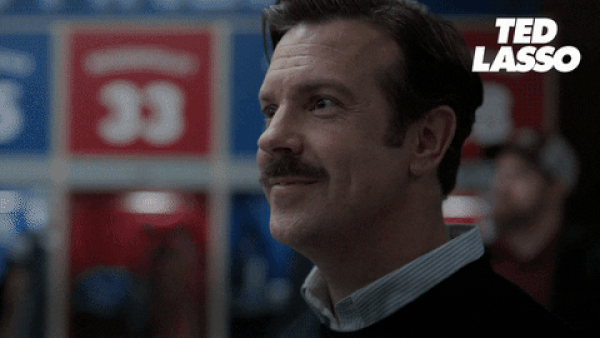How leaders should take their cue from TV’s Ted Lasso
The popular character from the Apple TV series shows how audiences are clamoring for a new kind of empathy and compassion.

Like millions around the world, I have become enamored with Apple TV’s “Ted Lasso.” Not only did Ted arrive during our darkest days of the COVID-19 pandemic, he showed up for us as a new kind of hero.
He’s human and I believe we’ve all gravitated so strongly to Ted because he shows us what leadership can and should look like. And he demonstrates the concept of “first among equals”—the idea that all members of a team are equal despite status—by bringing kit man Nate into the fold in season one. But despite Ted’s encouragement, our beloved Nate is having some trouble adjusting to his new role—and so are we.
We find ourselves in season two more invested than ever in AFC Richmond, but our diamond in the rough, previously bullied underdog Nate, is making us feel sad and uncomfortable. His behavior as a leader has vacillated between brilliant (taking charge when Ted had to exit the field due to a panic attack) and downright abusive (his treatment of the new kit man Will).
But maybe Nate’s behavior is making us feel the way we do because we’ve seen this play out in our own organizations. The move from individual contributor to formal leadership role is not as simple as we’d like it to be. We often wrongly assume that because someone was good at their job, they will be good at helping others do their jobs.
Our organizations seldom provide the training and mentorship that new leaders need. The transition from individual contributor to formal leader can be one of the most challenging a person will experience in their career. Add in the layer of leading people who were formally your peers or above you, and the complexity of being a new leader increases tenfold. In addition to being a new leader, Nate is obviously dealing with personal issues that impact his ability to lead. He is insecure, seeking validation through social media rather than through the people who care about him the most. He has unresolved issues with his father. His ego alternates between being inflated and deflated in a matter of moments.
The greatest leaders are not without their own personal struggles.
Everyone has their demons, things that have been hard for them to confront or get past. The dividing line between poor leaders, good leaders and great leaders is that great leaders are radically self-reflective. They adopt practices to examine their thoughts, actions and impulses; over time, they refine this, and they own the space between stimulation and response. Unreflective leaders are easier to spot. Often their behavior shows up as coercion, dishonesty, controlling behavior, manipulation, aggression or passivity to a level that causes as much harm as being wildly aggressive.
On this season of “Ted Lasso,” Nate is struggling with an unhealthy idea of what it means to lead. More often than not, he chooses authority as a means to motivate people, always making sure that the players and Will know that he is dominant. When Nate takes out his frustrations on them, we see unreflective leadership in action. Great leaders demonstrate a “first among equals” approach by treating everyone with dignity, no matter their rank.
Coach Beard is offering an example of such leadership, like when he gave Nate some startling straight forward feedback in his surprise “do better” moment. Coach Beard is doing exactly what leaders in organizations should do for one another: hold each other accountable.
Viewers asked themselves, “But what about Ted? When is he going to notice?” Ted is dealing with his own personal issues, and our natural inquiry speaks to the expectations we have of our most senior leaders. It is impossible for top leadership to know and see every dynamic in our organizations. Culture trickles down, meaning a great leader at the top will likely produce more great leaders in the organization, but that’s not guaranteed, nor foolproof.
People at every level of a company must get comfortable with upholding the values of their organization.
But perhaps the issue with Nate is that not everyone is ready or meant to be a leader.
Most organizations have limited career ladders for those not interested in people management. Because of that, we often have people move into leadership because it is the only way to gain seniority or a larger salary. Good leadership is incredibly hard. To serve others first is not for the faint of heart and requires leaders to suspend their ego. It demands they deal with those personal demons that are only exacerbated when the spotlight of leadership finds them.
There’s no shame in saying, “Leadership or people management isn’t for me.”
We need to normalize that in our organizations. It takes true strength to be so self-aware that you can admit to lacking the skillset or desire to manage people. Imagine an organization where we recognize seniority in a number of ways. We would hold onto institutional knowledge and breed a generation of informal leaders who can serve as senior peers, mentoring junior employees and serving as key advisors for formal leaders.
Earlier in this season, I predicted that as Nate’s behavior was brought into the sunlight, he would feel out of control, leading him to lash out more. My heart broke as this was confirmed in the last two episodes of the season. Nate’s betrayal of Ted, his misplaced anger and loathing and eventual departure from Richmond were the destructive behavior we see too often from unreflective leaders. Perhaps there is redemption in Nate’s future story arc, but only if he can face his demons. And yet, despite Nate’s betrayal, we want him to be successful and we want him to “do better.”
One of the hardest parts of leadership is watching scenarios like this one play out. But it can also be beautiful when a person does the work and does better.
Jenny Petty is vice president for marketing & communications at the University of Montana.







Awesome post Jenny! LOVE Ted Lasso!
Great article, spot-on, and thank you! One quick mention, let’s give a highlighted heads up to those who have yet to complete the season to stop reading before the last two paragraphs. I love the series too – brilliant!